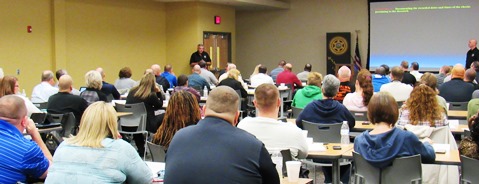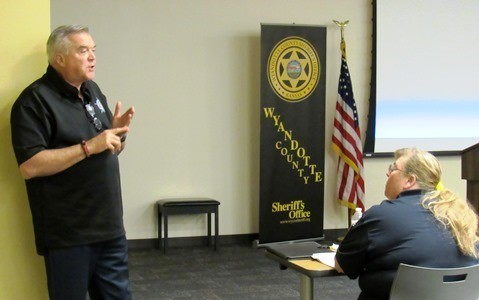by Mary Rupert
How can communities address crowded jails? How should body cameras be used in jails? Should jail inmates be allowed to receive all their mail? What about preventing rapes in jails?
All these hot-button issues and more are being addressed at a legal-based jail training session today and Thursday for sheriff’s officers and local correctional officers. The training is being held at the Kansas City Kansas Community College Dr. Thomas Burke Technical Education Center, 6565 State Ave.
About 80 persons from more than 20 different sheriff’s departments and county or city correctional facilities from Kansas and surrounding states were at this event. A representative of the U.S. Disciplinary Barracks also was in attendance. They are receiving in-depth training on the issues from national speakers.
According to a spokesman, Wyandotte County Sheriff Don Ash, the co-host of the event, hopes this training program will serve as a proactive way to deal with the issues facing jails throughout the country. Other hosts of the event are the Kansas Sheriffs’ Association and the Kansas Jail Association.
Gary DeLand, executive adviser and director with the National Institute for Jail Operations, said the biggest issues nationally currently tend to be jail crowding issues. It’s hard to build jails that will accommodate the need because tax money is involved.
Medical and mental health also is an emerging issue, he said.
“Most of the people who are brought into jails tend to be people with very poor medical issues, also, because they don’t take care of themselves, they take drugs or they live on the street,” he said.
In the past several years, it has become harder and harder to put mentally ill people into mental health facilities because of litigation, he said, so that some of them are now going to jails, which aren’t fully prepared to deal with that population.
“We have become the dumping ground in jails for the mentally ill,” DeLand said. A police officer may cite persons for trespassing or vagrancy to justify getting them to jail so they are not harassing people on the streets or so they don’t hurt themselves.
Inmate mail is another issue, he said. There are people who send materials to inmates that they hope the jails will reject so the jails can be sued, he said.
The courts have allowed some level of force to restore or maintain order, he said, and that becomes a big issue.
“We run like a city, enclosed, where we have to provide all the services a city does,” he said. The difference is most of the people who live in the community are pleased to be alive, while the people in jails don’t want to be there, so they have nothing good to say about their circumstances, he added.
In the past, inmates, who make up less than a half-of one percent of the population, filed a quarter of all lawsuits in the federal system, and currently that number has dropped to about 15 percent, he said. The taxpayers have to pay to defend those suits and also have to pay if they lose.
“That’s why we’re doing this training here,” he said. “We want everybody to be fully prepared, or as prepared as they possibly can be, to anticipate the kinds of things that inmates will sue over, to know the things that they have to do to maintain a proper relationship with the inmates, to know the kinds of things the courts will come back at them for if they don’t do.”
Tate McCotter, administrator of the National Institute for Jail Operations, thanked Sheriff Ash and Wyandotte County for sponsoring this event.
“Some folks drove 12 hours to be at this training,” he said, and some came here from other states.

[embedyt] http://www.youtube.com/watch?v=c9i2K_cOvUw[/embedyt]
Gary DeLand, executive adviser and instructor for the National Institute for Jail Operations, addressed legal issues for jails at a program today at the Kansas City Kansas Community College Dr. Thomas Burke Technical Education Center, 6565 State Ave., Kansas City, Kan. The co-host of the program was the Wyandotte County Sheriff’s Department. (Video by Mary Rupert)

